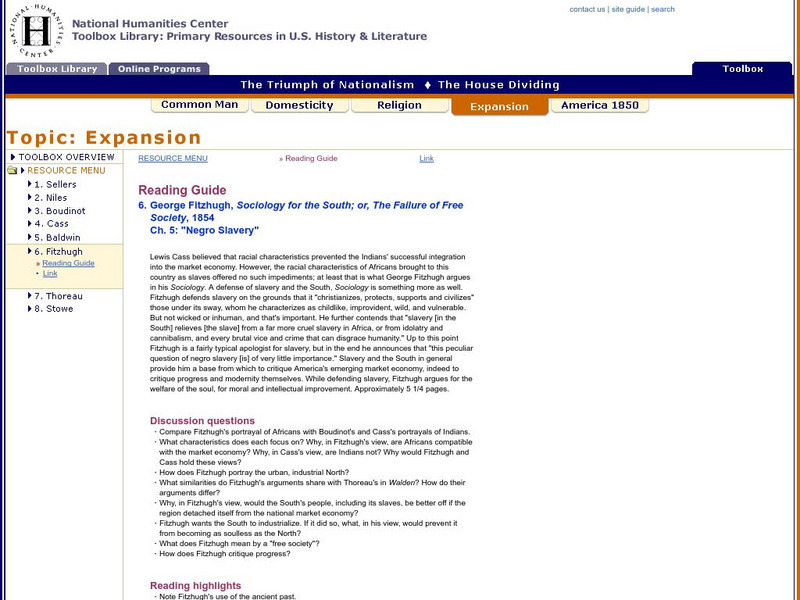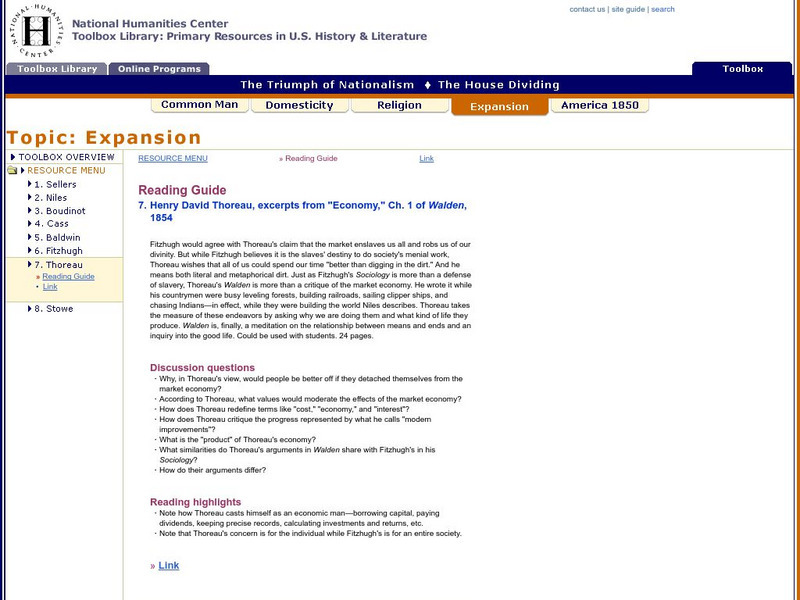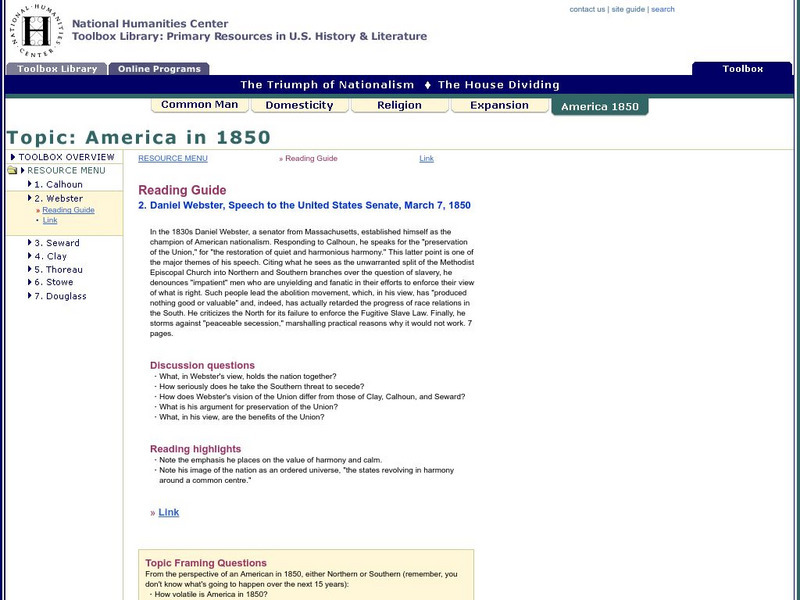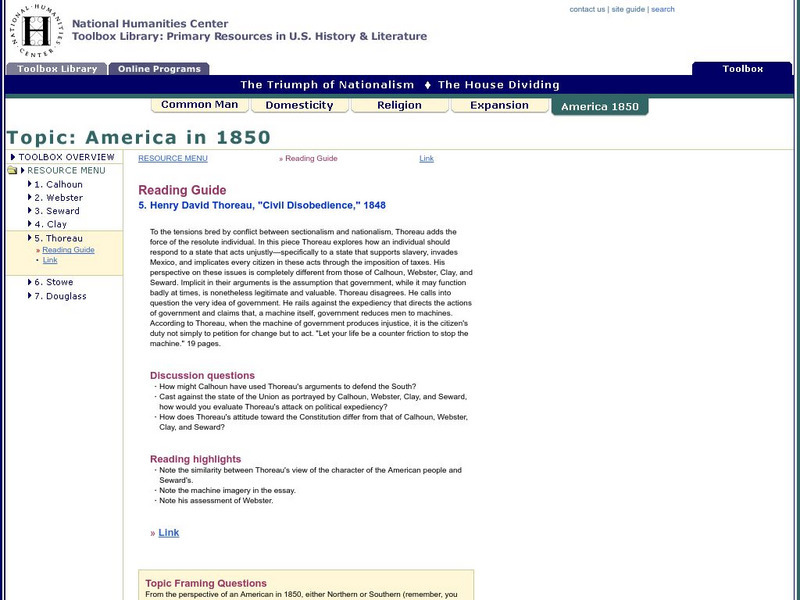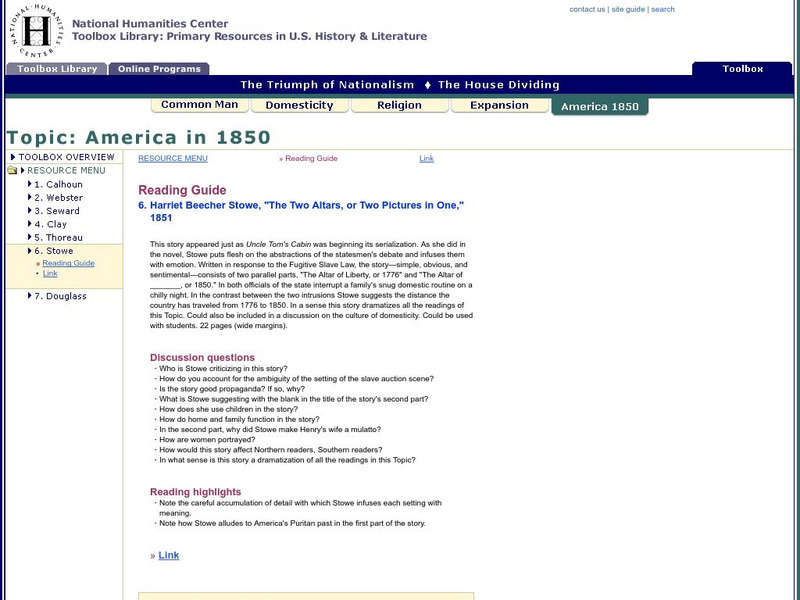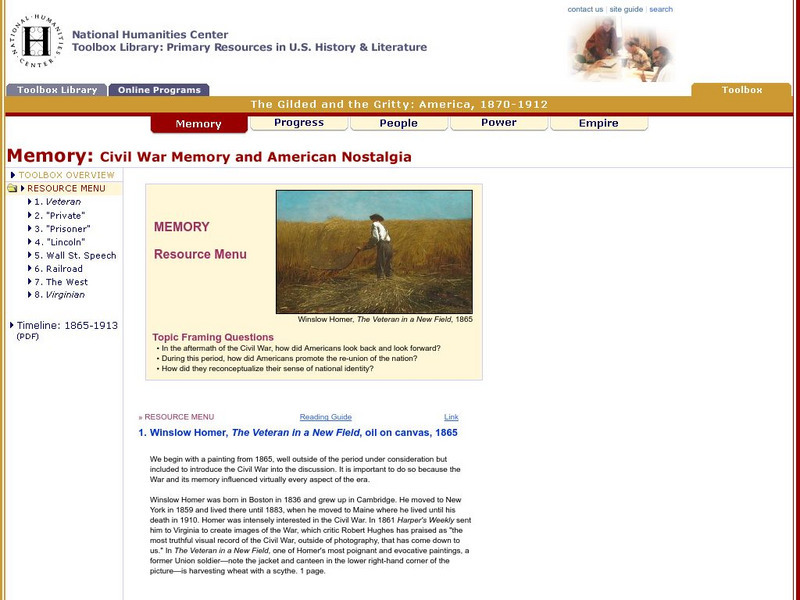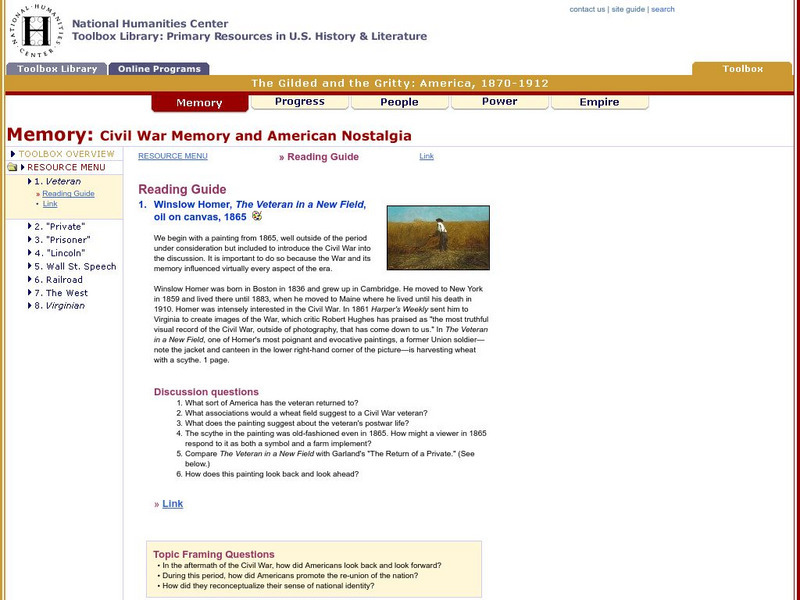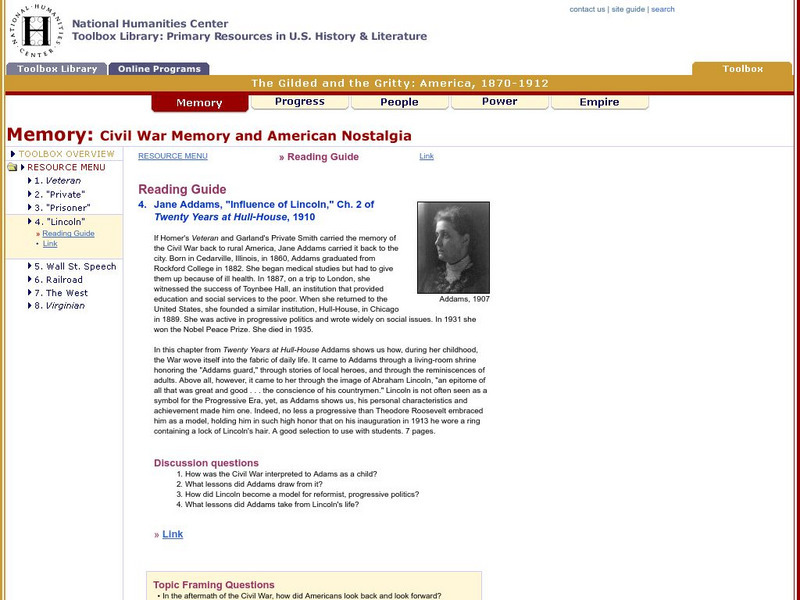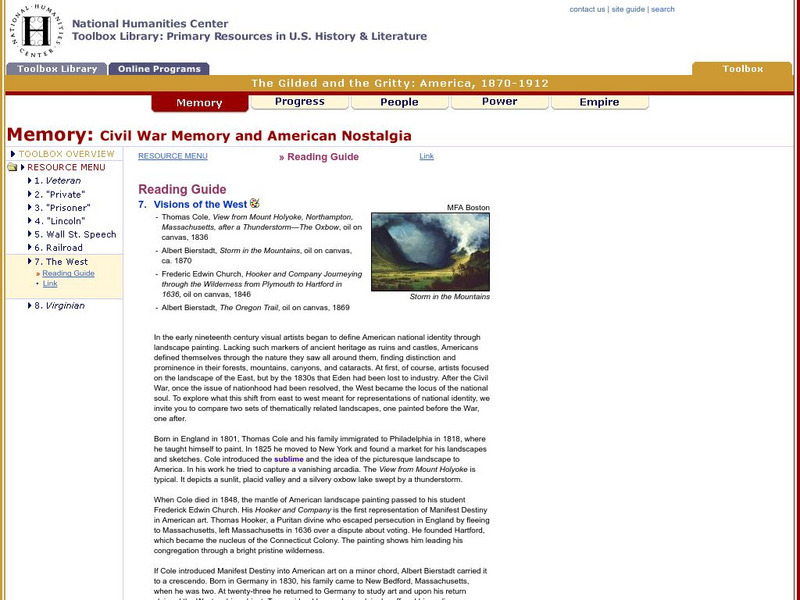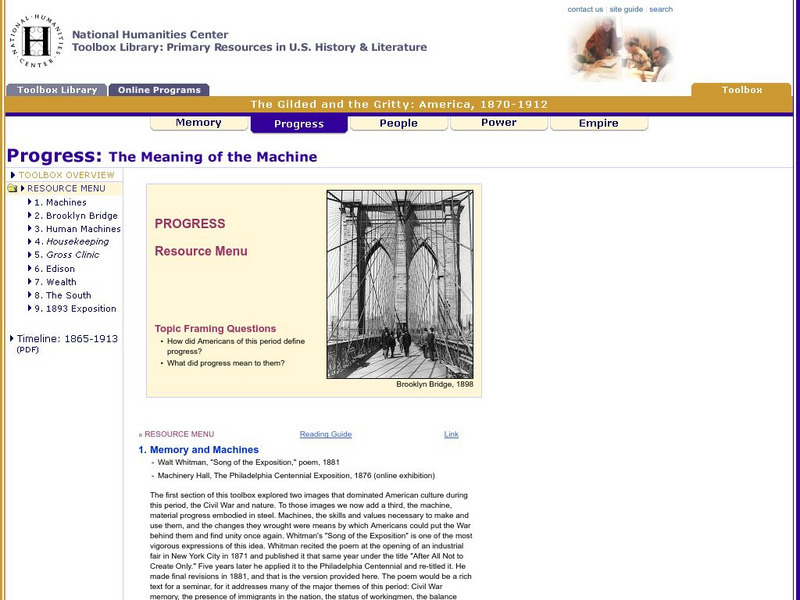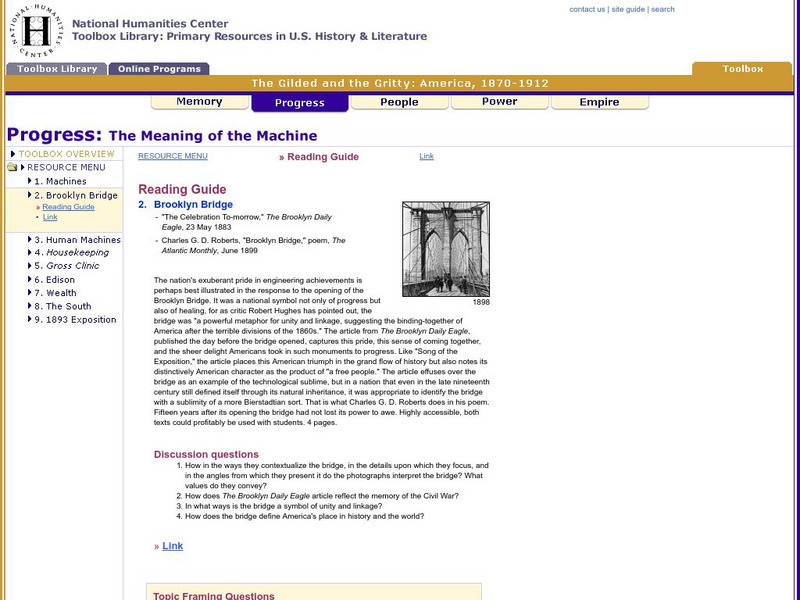National Humanities Center
National Humanities Center: Toolbox Library: James G. Baldwin: Triumph of Nationalism: America, 1815 1850
An essay that describes the exuberant life of a frontier society with all its corruption, violence, vitality, and opportunity.
National Humanities Center
National Humanities Center: Toolbox Library: Reading Guide: George Fitzhugh: Chap. 5, "Negro Slavery"
A chapter in George Fitzhugh's apology for slavery in which he argues that slavery brings clear benefits to those who were enslaved.
National Humanities Center
National Humanities Center: Toolbox Library: Henry David Thoreau, Excerpts From "Economy," Ch. 1 of Walden, 1854
A chapter from Walden that critiques and challenges the new market economy of the nineteenth century.
National Humanities Center
National Humanities Center: Toolbox Library: Expansion: Harriet B. Stowe: Uncle Tom's Cabin, Ch. 1
Discussion questions that guide the reading of Chapter 1 of Harriet Beecher Stowe's influential novel, Uncle Tom's Cabin. Hyperlink to the entire text.
National Humanities Center
National Humanities Center: Toolbox Library: America in 1850: John C. Calhoun
Collection of primary resources on Nationalism, John C. Calhoun on the Clay Compromise Measures, and U.S. Senate, March 4, 1850. Thematically organized with notes and discussion questions.
National Humanities Center
National Humanities Center: Toolbox Library: Toolbox: America in 1850: Daniel Webster
The National Humanities Center presents collections of primary resources compatible with the Common Core State Standards including Daniel Webster, Speech to the United States Senate, March 7, 1850.
National Humanities Center
National Humanities Center: Toolbox Library: William Seward, Triumph of Nationalism: America, 1815 1850
The National Humanities Center present a reading guide that links to a speech in the Senate by William Seward, one that expresses moral outrage over the compromises allowing the expansion of slavery.
National Humanities Center
National Humanities Center: Toolbox Library: America in 1850: Henry Clay
Collection of primary resource material includes Henry Clay's, "A General Review of the Debate on the Compromise Bills," U.S. Senate, July 22, 1850. With questions for discussion.
National Humanities Center
National Humanities Center: Toolbox Library: Henry David Thoreau: Civil Disobedience: 1848
Thoreau's essay that calls for citizens to break unjust laws, particularly those promoting the continuation and expansion of slavery.
National Humanities Center
National Humanities Center: Toolbox Library: Harriet B. Stowe, Triumph of Nationalism: America, 1815 1850
A fictional depiction of the turmoil over the existence of slavery-and its human impact.
National Humanities Center
National Humanities Center: Toolbox Library: The Gilded and the Gritty: America, 1870 1912
Ninety-four primary sources-historical documents, literary texts, and visual images-that explore the challenges, opportunity, and turmoil of late-nineteenth-century America. They examine the economic expansion in an America re-united...
National Humanities Center
National Humanities Center: Toolbox Library: Memory, the Gilded and the Gritty: America, 1870 1912
Twelve primary sources - historical documents, literary texts, and visual images - that explore ways in which the memory of the Civil War affected American life in the last quarter of the nineteenth century.
National Humanities Center
National Humanities Center: Toolbox Library: Veteran, the Gilded and the Gritty: America, 1870 1912
A poignant Winslow Homer painting (1865) that suggests the psychic state of Civil War veterans.
National Humanities Center
National Humanities Center: Toolbox Library: "Prisoner," the Gilded and the Gritty: America, 1870 1912
Joel Chandler Harris's short story, "Aunt Fountain's Prisoner", that depicts a successful triumph over the challenges of reuniting a country divided by Civil War.
National Humanities Center
National Humanities Center: Toolbox Library: Memory: Civil War Memory and American Nostalgia: Influence of Lincoln
An excerpt from Jane Addams' autobiography "Twenty Years at Hull House" that describes how Abraham Lincoln inspired her urban reform efforts.
National Humanities Center
National Humanities Center: Toolbox Library: Wall Street Speech, the Gilded and the Gritty: America, 1870 1912
A "bloody shirt" speech from Robert Ingersoll that emphasizes the virtue of Republican candidates and attacks Democrats as traitors during the Civil War.
National Humanities Center
National Humanities Center: Toolbox Library: Railroad, the Gilded and the Gritty: America, 1870 1912
A speech and an engraving that illustrate how the railroad helped to unite the country after the Civil War.
National Humanities Center
National Humanities Center: Toolbox Library: America, 1870 1912: Visions of the West
The National Humanities Center presents collections of primary resources compatible with the Common Core State Standards, historical documents, literary texts, and works of art, thematically organized with notes and discussion questions....
National Humanities Center
National Humanities Center: Toolbox Library: Progress, the Gilded and the Gritty: America, 1870 1912
Eighteen primary sources-historical documents, literary texts, and visual images-that explore the industrial, racial, and technological progress of the late-nineteenth century.
National Humanities Center
National Humanities Center: Toolbox Library: Progress: The Meaning of the Machine: Memory and Machines
A poem by Walt Whitman, "Song of the Exhibition," and the on-line catalog of the 1876 Philadelphia Exposition that celebrate the growth, power, and expansion of the nation.
National Humanities Center
National Humanities Center: Toolbox Library: Progress: The Meaning of the Machine: Brooklyn Bridge
An essay and a poem about the Brooklyn Bridge that celebrate its power and majesty as emblems of industrial America during the late 1800's.
National Humanities Center
National Humanities Center: Toolbox Library: Progress: The Meaning of the Machine: Human Machines
An excerpt from efficiency expert Frederick Winslow Taylor's The Principles of Scientific Management that describes how to make a human work like a machine; painter Thomas Anshutz's The Ironworkers' Noontime that suggests the cost of...
National Humanities Center
National Humanities Center: Toolbox Library: Progress: The Meaning of the Machine: The New Housekeeping
An essay that urges women to bring the principles of scientific management found within industrial America into the home and housework.
National Humanities Center
National Humanities Center: Toolbox Library: Gross Clinic, the Gilded and the Gritty: America, 1870 1912
Thomas Eakins's controversial painting that reflects the skill of professional, scientific practitioners during the late-nineteenth century.

